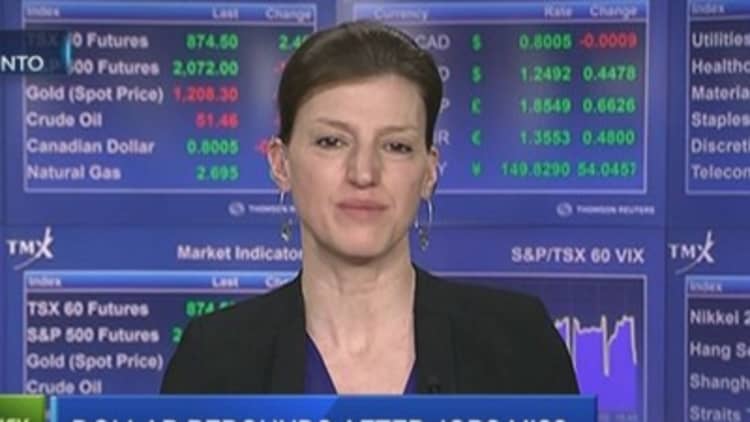The dollar traded higher on Wednesday after the release of the Federal Reserve's FOMC meeting minutes.
The dollar index rose 0.22 percent at 98.03 after trading down at 97.80 for the day, while the euro hit a session low of $1.0763, down nearly 0.5 percent against the greenback. The euro was last down 0.3 percent at $1.07881.
The yen also lost ground against the greenback following the minutes release. The dollar last traded at 120.06 yen after trading at 119.82 shortly ahead of the release.
Federal Reserve members found themselves at a crossroads during their pivotal March meeting, torn between hiking rates in June, September—or even waiting until 2016, according to meeting minutes released Wednesday.
Ultimately, the Federal Open Market Committee opted to make a key linguistic move, dropping the word "patient" from previous post-meeting statements concerning the approach to raising interest rates
Earlier, the dollar eased, backing away from a nearly three-week high hit against the yen.
The dollar strengthened for several months, in part due to the performance of the U.S. economy against the rest of the world, and anticipation of tighter U.S. policy.
"The Fed is the only central bank in the world talking about tightening policy; everybody else is talking about easing," said Ron Simpson, director of currency research with Action Economics in Tampa, Florida, ahead of the release. "In the bigger picture, the dollar has room to go higher."

Policymakers signaled in a statement after their March meeting that rates might rise later than many investors had anticipated, and some Fed officials have noted that the dollar's rally does affect the economy. If the minutes show any unease from Fed policymakers about the dollar's steep rise, the greenback could dip further.
The greenback was also waning before the start of a U.S. corporate earnings season that could show the negative impact of a strong currency, spreading caution about any rate hike in the world's largest economy.
The dollar declined earlier after Japanese policymakers did not add to easing, as some institutional investors expected.
Governor Haruhiko Kuroda said that because of easing steps taken last October, a slowdown in inflation had not hurt forward inflation expectations, reducing the chances of a further expansion in Japan's asset-buying program in coming months.
Read MoreStrong dollar squeezing 'Made in USA' firms
As a result, the yen climbed and knocked the dollar from a nearly three-week high of 120.45 yen hit on Tuesday.
—CNBC's Jeff Cox contributed to this report.

